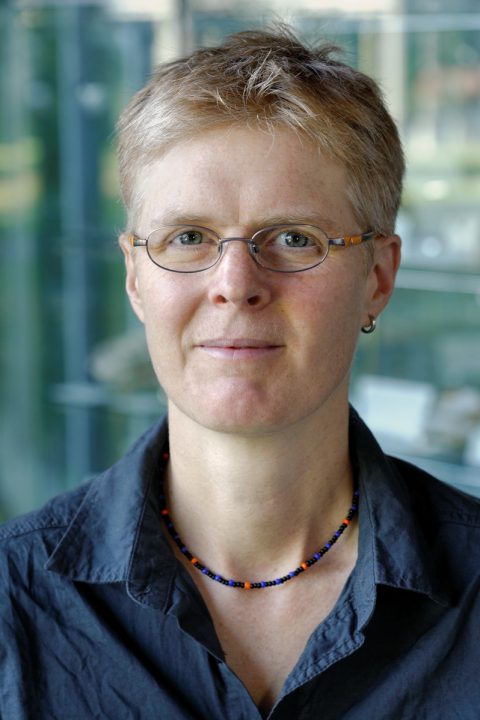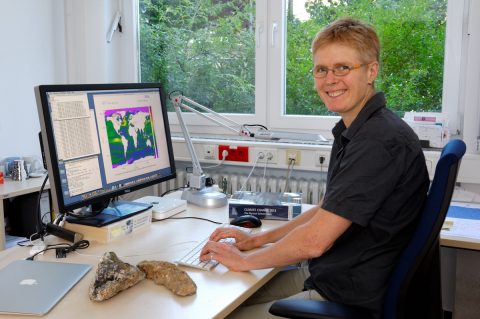Birgit Schneider is a professor for Paleoclimate Modeling at Kiel University. In her group, they are using numerical climate models (ocean, atmosphere, sea-ice) in combination with ocean biogeochemical models, which simulate the cycling of elements (e.g. carbon, nutrients, oxygen) in the water column. They are addressing questions of past, present and future climate variability and climate change with a special focus on the ocean, for example its role as a sink for natural and anthropogenic CO2. She’s presently deputy head of the institute (15 professorships), and from her working time she spends 40 % on teaching, 50 % on administration and about 10 % on science.

Prof. Dr. Birgit Schneider. Photo: Stefan Kolbe, Kiel University
What did inspire you to pursue a career in marine sciences?
I was always interested to understand how the earth and in particular the climate system works. As a student in geography, I moved from Berlin to Kiel to be able to study oceanography as a secondary subject. The ocean plays a key role in the climate system and I very much enjoy global thinking. I was very happy when I got the chance to do a PhD in marine biogeochemical modeling, which brought me into marine research.
What are the main things you enjoy about being a marine scientist?
In the first place, it is the independence of a scientist, which fascinates me in my everyday work. We’re seeking the topics and questions we think that are most interesting and relevant to investigate, ourselves. We try to find solutions, which have not been found before. And we have to question our own results and conclusions, to see if they are plausible and robust. Marine biogeochemical and paleoclimate modeling is a rather small field, but it is highly interdisciplinary. With every new question we tackle, there is always something new to learn from the other connected disciplines.

Prof. Dr. Birgit Schneider in her working environment. Photo: Stefan Kolbe, Kiel University
Do you think there is a need for special girls’ support to study marine sciences?
I’m not sure if young women really need special support to decide for a career in (marine) science. I think it would be more important and encouraging to see that the chances are equal and that there are as many successful women as men in science. But this is still a long way, I’m afraid.
Do you think there is a need for special support to retain women in science?
I guess the reasons why women leave science are manifold and, although always mentioned first, family issues is only one of them. Of course, a better agreement of work and family including parental leave, financial support, part-time employment and good childcare facilities are needed. It is good to notice that family friendliness is an important point on the agendas of politicians, funding agencies and universities in Germany. But the idea has still not reached the basis. As long as for example parental leave is not well received by colleagues and especially supervisors, even if the opportunity exists, it will not be easy for young women to decide for a family. This is very different in other countries, for example in Scandinavia.
Apart from that and maybe even more important, I think that the scientific world itself is probably not very attractive for women. The highly competitive nature of the science system is very male-dominated. I’m not against competition, but the criteria to be successful in the system are important. For example, scientific merit is often judged by the length of a publication record, rather than looking at scientific quality. I’m convinced that men and women equally suffer from the paradigm of ‘publish or perish’, but I guess that men are more willing to take up this challenge.
A very similar point is the question of working hours. Especially senior (male) scientists, who often serve as (the only existing) role models, still practice and spread the attitude that for a successful scientific career one has to spend 70 hours per week at work. We are all devoted to our scientific work, but honestly, nobody can work effectively 70 hours in a week. This brings me back to the criteria for scientific success. They have to be achievable with regular working conditions, allowing for a life beyond science.
Finally – although I guess this list is far from being complete – I think that precarious working conditions let women seek for less good but maybe more secure job opportunities earlier than men.
What advice would you give any woman considering science as a career path?
As a scientist you’ll face many ups and downs. There is financial insecurity and often your ideas, papers and proposals will be rejected, at least at the first try. But it is also very rewarding when you see that conviction and persistence pay off and that finally your ideas are getting accepted. Certainly, there are easier jobs than being a scientist, but it is a great profession and if this is really what you want to do, then go for it.
What is the most effective way for you to maintain balance of your professional and personal life?
I have two little children. This is an automatic balance against work overload. And I have the privilege of a permanent position.
What are your professional and personal dreams?
At the top of my wish list for my professional life is time for thinking. German university professors are heavily overloaded with teaching and administrative issues. Especially women do above average committee work, because of the quest to gender balance. This leaves very little room for scientific thinking. Personally, I’d wish to have a healthy life. Since my children were born when I was above forty, this would mean that we still have plenty of time to spend together.